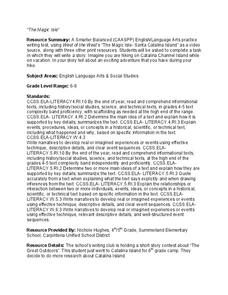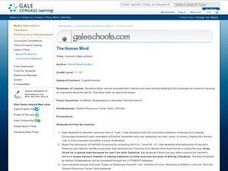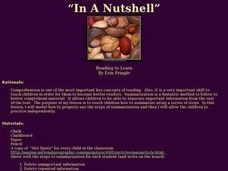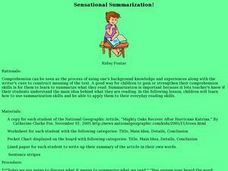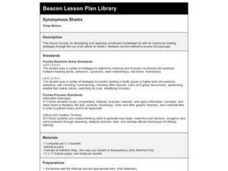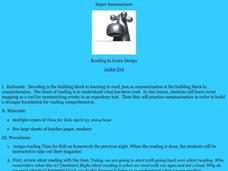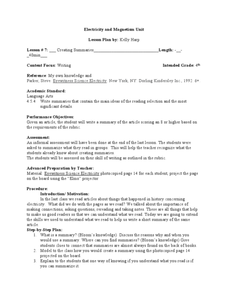Curated OER
Short and Sweet Science
Readers learn how to summarize scientific text and evaluate the advantages, disadvantages, and challenges in writing summaries. They select science-related articles you've pulled and collected from the New York Times and, with a partner,...
Channel Islands Film
Magic Isle: Lesson Plan 3
Middle schoolers complete a writing assessment task to demonstrate their ability to craft a narrative based on a variety of informational texts. They view West of the West's documentary Magic Isle, read three print resources about the...
Curated OER
From America, With Love
Students research the experiences of specific immigrant groups in the United States. Letters are written from imaginary immigrants to relatives in their countries of origin, including historically accurate details.
Curated OER
Let's Get it Together! Reading to Learn
Let’s learn about frogs! Young readers are led through “Freaky Frogs,” a non-fiction article. Teach learners how to edit an article so there are fewer details to sift through. After talking through the article, they learn the six steps...
Curated OER
Homemade Holidays
Foster your high schoolers' creativity - and generosity - with this writing lesson. After reading the article "Homemade Holiday Gifts" by Frances Janisch (from the GALE Student Resource Center - Gold), pupils meet in groups to brainstorm...
Curated OER
The Original's Sins
Are history textbooks plagiarized? The New York Times article, “Schoolbooks Are Given F’s in Originality,” looks at this question and forms the basis for a lesson plan on textbooks and plagiarism. The very detailed plan includes resource...
Curated OER
Only the Facts
Practice the strategy of summarizing to gain meaning and knowledge from an informational text. Young readers highlight supporting details and main ideas, and then they use this to summarize two articles: "The Great Quake" and "What is an...
Curated OER
St. Patrick's Day: James Joyce
Whether it's St. Patrick's Day or not, this lesson plan can be a great way to study James Joyce and how his heritage has influenced his writing. The lesson plan is meant to be used with the Gale database, specifically the Student...
Teach Engineering
Tell Me Doc—Will I Get Cancer?
Can you beat the odds of cancer? In the first installment of a seven-part series, future biomedical engineers consider how to detect and diagnose cancer. An article on biosensors provides useful information toward this goal.
Curated OER
Hamlet's State of Mind
Analyze various excerpts from Hamlet and read articles to develop an argument about his sanity. Middle and high schoolers write an argument essay defending whether or not they believe Hamlet is insane. You could modify this assignment...
For the Teachers
Cause and Effect Matrix
Study cause and effect in both literature and informational text with a lesson designed for several different reading levels. After kids review the concept of cause and effect, they read an article or story and note the causes and...
For the Teachers
Sequence Plot Chart
Your kids can identify the plot sequence of a short story, but what about an informational article? Have them examine the chronological order of events in informational texts with a lesson on the sequence of events.
Curated OER
In a Nutshell
Students summarize a non-fiction article in this lesson. They review a six step process for summarization. They then read the assigned article, and work as a class to write a summary using the five steps provided. They then write an...
Curated OER
Let's Get Ready to Summarize
Pupils practice a summarizing strategy in this lesson. They are given a copy of a "National Geographic Kids" article and are encouraged to read it silently. They then use the steps provided to write an individual summary of the article.
Curated OER
Summing Up SuperCroc
Students read an article in a magazine about crocodiles silently, remembering not to make a sound, and trying hard to understand what the author is trying to tell them. They then write down some important facts they have read on a piece...
Curated OER
Look Who's Summarizing!
Learners summarize an article in this lesson. Students observe the teacher summarizing a short paragraph. They then look at a National Geographic KIDS and read an article. They use a highlighter to highlight important facts to be...
Curated OER
Whose Business Is It?
Students read articles in The Times Business Day section and share their opinions on the articles. They search through the Business Day section of The Times to find items to complete a scavenger hunt. They summarize a teacher selected...
Curated OER
What is Going On?
Learners summarize a fiction text. After reviewing the correct way to read in order to glean important information for summary, students independently read a nonfiction article. They write a summary paragraph using the process outlined...
Curated OER
Sensational Summarization!
Students observe and demonstrate a variety of summarization strategies. They silently read an article from National Geographic Kids, and as a class write a summary that includes the main idea and details and the five W's. Students then...
Curated OER
Synonymous Sharks
Students locate and read an Internet article on sharks. They write a summary of the article, and complete a Concept of Definition Map using information from the article.
Curated OER
Super Summarizers
Young scholars examine the process of summarization by creating an event map. They discuss the process of summarizing text, then silently read an article from "Time For Kids" magazine. Students observe the teacher create a map for the...
Curated OER
Face to Face Summary!
Students, while in the computer lab visiting the National Geographic Kids website, fill out a checklist of unimportant/redundant information, look for important events and ideas and search for the author's main idea and supporting...
Maine Content Literacy Project
Introduction to Literacy Criticism
As learners continue to examine a short story of their choice, they take some time to look at analysis completed by others on the same story. In the eleventh lesson in a series of fourteen, pupils explore various sites for literary...
Curated OER
Creating Summaries
Fourth graders generate written summaries from non-fiction articles. In this writing activity, 4th graders determine what must be included in writing a good summary and then work in small groups to construct summaries after reading...



